- Salesforce Boosts its Marketing Cloud with Partnership with AI and Google | A Complete Guide For Beginners
- A Definitive Guide to Create a Salesforce Web-To-Lead Form | Expert’s Top Picks
- Top 10 Features of Salesforce Lightning | Expert’s Top Picks
- What is SOQL ? : SOQL Queries | A Definitive Guide [ OverView ]
- What are Context Variables in Salesfoce Tiggers ? | A Definitive Guide [ OverView ]
- Testing APEX In Salesforce | A Complete Guide For Beginners [ OverView ]
- Salesforce Lookup Relationship : Expert’s Top Picks | Everything You Need to Know
- Questions that Will Help You Decide if a Salesforce Certification is Right for You
- Automation Tools in Salesforce
- salesforce developer certification changes and improvement
- Most Common Questions About Salesforce Certification
- How to become a Salesforce Developer?
- Salesforce Salaries
- Features of the Salesforce Platform
- What Does The Future Hold For Salesforce?
- Salesforce Developer Exam Process And Eligibility
- Salesforce Developer Certification, Jobs And Salary Trends
- What is Salesforce Workbench?
- Salesforce Boosts its Marketing Cloud with Partnership with AI and Google | A Complete Guide For Beginners
- A Definitive Guide to Create a Salesforce Web-To-Lead Form | Expert’s Top Picks
- Top 10 Features of Salesforce Lightning | Expert’s Top Picks
- What is SOQL ? : SOQL Queries | A Definitive Guide [ OverView ]
- What are Context Variables in Salesfoce Tiggers ? | A Definitive Guide [ OverView ]
- Testing APEX In Salesforce | A Complete Guide For Beginners [ OverView ]
- Salesforce Lookup Relationship : Expert’s Top Picks | Everything You Need to Know
- Questions that Will Help You Decide if a Salesforce Certification is Right for You
- Automation Tools in Salesforce
- salesforce developer certification changes and improvement
- Most Common Questions About Salesforce Certification
- How to become a Salesforce Developer?
- Salesforce Salaries
- Features of the Salesforce Platform
- What Does The Future Hold For Salesforce?
- Salesforce Developer Exam Process And Eligibility
- Salesforce Developer Certification, Jobs And Salary Trends
- What is Salesforce Workbench?
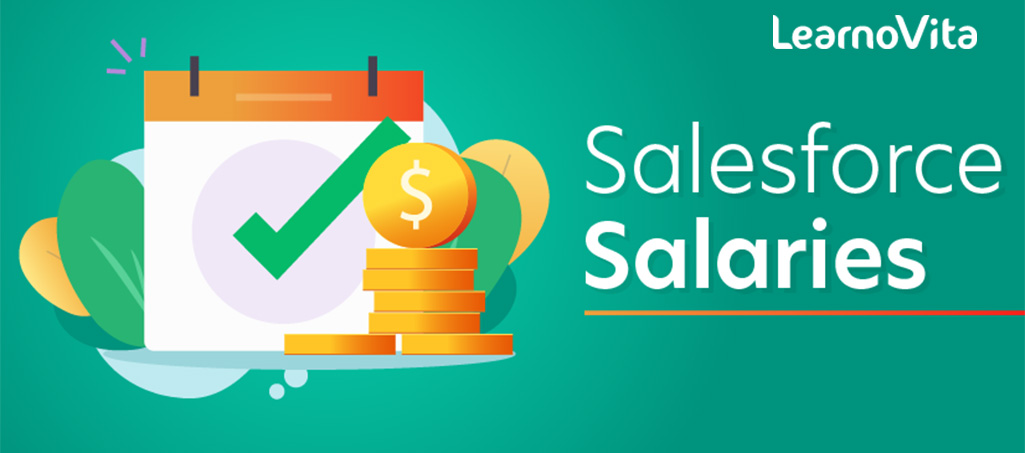
Salesforce Salaries
Last updated on 04th Oct 2020, Artciles, Blog, Salesforce
IT recruitment firm Mason Frank recently conducted gathering opinions from Salesforce professionals. Topics included current salaries, further earning potential, development opportunities, benefits, and overall job satisfaction.
Responses came from professionals in a number Salesforce roles—from admins and project managers to functional consultants, technical consultants, and architects. Automation Champion was noted as a key resource for Salesforce professionals looking to gain industry knowledge and insights, too!
Here’s a breakdown of the key findings from the survey:
Subscribe For Free Demo
Error: Contact form not found.
Skills, experience, and certification
Only 30% of respondents believe that a degree is important for a career in Salesforce, but the majority believe that additional experience would help them to increase their earning potential.
For some, this is experience via courses and credentials, for others, it’s having spent time working with a broad range of business functions, and for the rest, it’s about more years in the industry.
One thing is clear though, and that’s the value of Salesforce certifications within the ecosystem. A massive 77% of Salesforce professionals now hold at least one Salesforce certification, and employers really seem to value them:
- 75% of employers contributed to the cost of the tests for their employee
- Of those professionals whose employers chipped in for their certification, 91% had it paid for in full
- More than a third (39%) of respondents reported that their salary had increased since completing their certification
Diversity in the industry
Diversity and inclusion is a hot topic and is an area in which the tech industry is often perceived to be lacking. Despite this, 73% of respondents said they believe their company is gender-balanced, and 76% said that it is culturally diverse. However, only 41% said that their company workforce included workers with a disability.
Company benefits and perks
The benefits and perks of a job are increasingly becoming deal-breakers for employees when it comes to accepting a job offer— particularly for millennials. Companies offering treats that will genuinely appeal to people and increase happiness at work are more likely to retain employees. The most sought-after benefits for respondents were health insurance and remote working.
Job satisfaction and employee loyalty
Almost one in every five respondents (18%) stated they felt undervalued at work—of those respondents, 20% said this was down to employers not appreciating or understanding the value of their technical expertise. This is a dangerous position for employers to put professionals in; in today’s market, employees are not afraid to up sticks and leave if they feel overworked, underappreciated, or simply unfulfilled.
This is evident in the rise of ‘job-hopping’ in recent years and is reflected in the survey responses concerning time served at one company. Only 7% of respondents had been in the role for over ten years:
- 73% had been with their current employer for 0-3 years
- 13% had been with their current employer for 4-6 years
- 7% had been with their current employer 7-10 years
Furthermore, only 64% of respondents plan to be with the same company in 12 months’ time. The main reasons for people wanting to change jobs within the next year were lack of salary increase (62%), lack of career prospects (57% ) and the need for new challenges (53%).
Lack of added benefits and remote working were also popular reasons to look for a new role, showing that businesses that fail to embrace truly valuable perks and new ways of working are in legitimate danger of losing out on the best talent.
Willingness to relocate
Along with a rejection of unsatisfactory benefits and working conditions, Salesforce professionals also seem to be more open to relocation in today’s market. Overall, 54% of global survey respondents said they would consider relocating to another country or city for work.
Top reasons to relocate were for financial gain, career growth, and to be with family/friends. The US was the most popular destination for relocation; for American Salesforce pros, the UK, Canada, and Germany ranked as the most desirable places to move to.
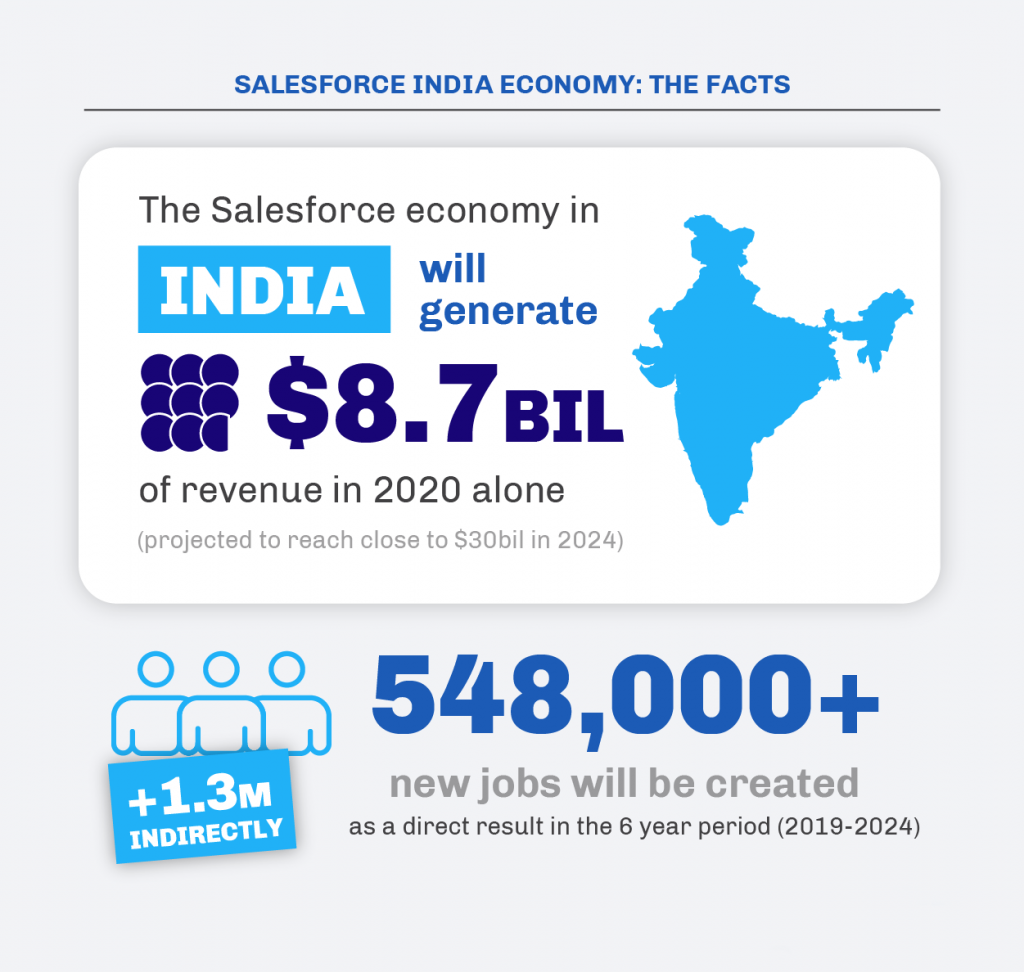
India has been a Salesforce hotspot for the past 3-4 years. For a structurally diverse country, investing in the right skills is key to building a workforce that is ready for the future. And Trailhead does just that in the best possible way! Bringing flagship events like TDX to the country and the growing Salesforce community are reliable signals of this huge potential.
It’s a good time to take a look at how the job market is shaping up in India!
What We Asked?
We launched a survey with 7 questions covering the type of role, salary, years of experience, certifications, and location.
These are the questions we set out on a mission to answer:
- What the average salary is for Junior/Mid-level/Senior Salesforce Admins, Developers, Consultants, Marketers (and more),
- Where Salesforce professionals are based and how salaries vary by city,
- How many certifications professionals hold, and is this a factor in determining salary?
I went away and analysed the 1670+ results.
I would like to underline that the data we gathered is self-reported data, which can often be misleading. Some sample sizes were too insignificant to include. We are reporting back on the information we gathered, but feel free to disagree with our findings in the comments section.
>Average Salesforce Salaries in India
| Role | Average Salary (₹) |
|---|---|
| Salesforce Administrator | 8,86,659 |
| Salesforce Developer | 9,00,835 |
| Business Analyst | 8,49,695 |
| CRM Manager | 12,07,500 |
| Marketing Automation Specialist | 8,63,333 |
| Marketing Cloud Consultant | 8,37,200 |
| Pardot Consultant | 6,61,518 |
| Project Manager | 19,17,739 |
| Salesforce Consultant – Functional or Technical | 12,77,967 |
| Solution Architect | 22,09,977 |
| Technical Architect | 26,76,672 |
| Tester | 7,52,285 |
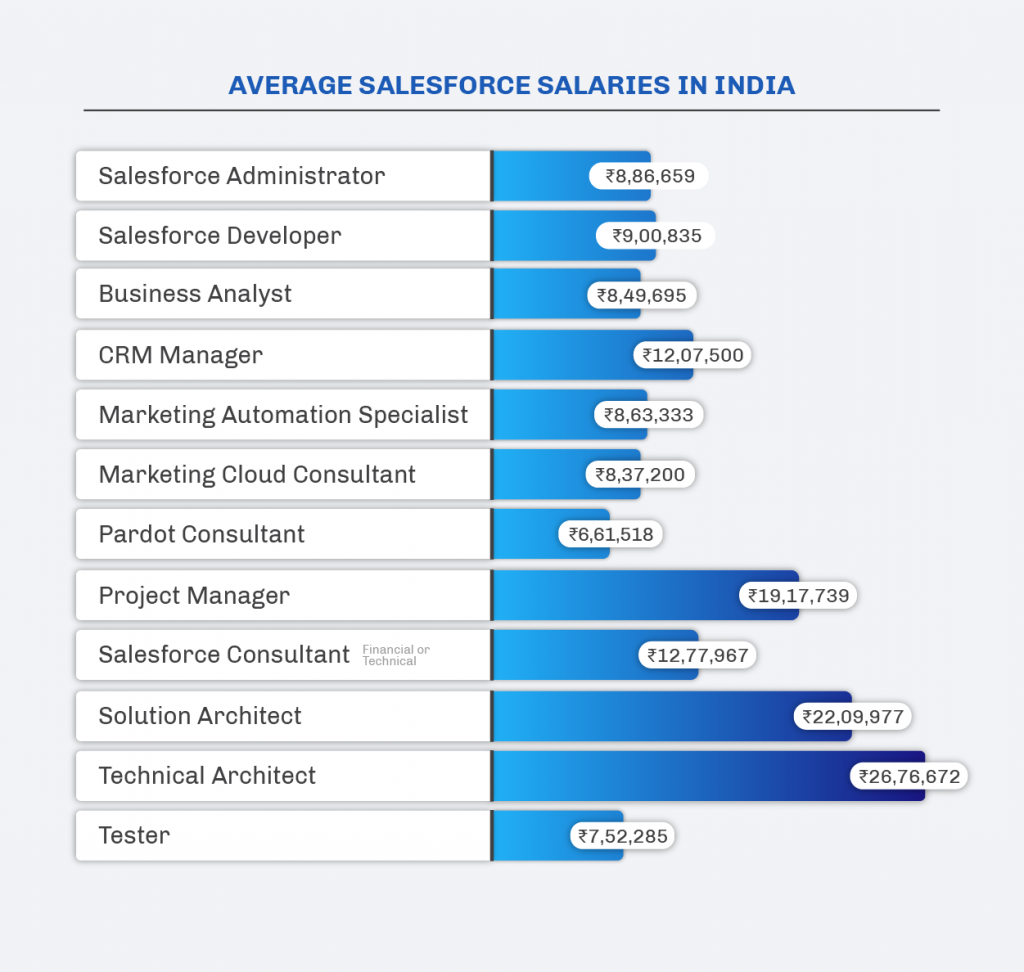
With more than half a million jobs expected to be created by 2024 with AI and IoT taking the centre stage, Salesforce will surely be a force to reckon with in the Indian context. Contrary to the country’s image of being a cost-effective IT services hub, Salesforce partners are investing big in the right skills to be the trusted digital enablement partners to Salesforce customers worldwide. This is validated by the substantial uptick in acceptance of Salesforce among developers in the recent past. The Salesforce Salary India Survey 2020 is bringing to the surface a whole gamut of insights on what to expect, especially when one is transitioning into Salesforce.
Salesforce Salaries vs. Experience in India
For the purposes of keeping this guide simple, we set the following experience categorisation:
- Junior = Less than 3 years (“Less than 1 year” and “1-2 years” in the survey)
- Mid-level = Between 3-5 years
- Senior = Greater than 5 years (“5-7 years” and “8+ years” in the survey)
Salesforce Admin
Here is how Salesforce Admin salaries increase as individuals gain experience (measured in years):
| Seniority | No. years of experience | Average Salary (₹) |
|---|---|---|
| Junior Admin | < 3 years | 4,63,831 |
| Mid-level Admin | 3-5 years | 6,78,263 |
| Senior Admin | 5+ | 16,20,400 |
Salesforce Developers
Here is how Salesforce Developer salaries increase as individuals gain experience (measured in years):
| Seniority | No. years of experience | Average Salary (₹) |
|---|---|---|
| Junior Developer | < 3 years | 5,00,924 |
| Mid-level Developer | 3-5 years | 9,18,768 |
| Senior Developer | 5+ | 15,59,554 |
Salesforce Consultants
I predicted that measuring Salesforce consultant salaries may not be straightforward. Remember, I said that this is self-reported data, a factor that I will return to later in the analysis.
Here is how Salesforce consultant salaries increase as individuals gain experience (measured in years):
| Seniority | No. years of experience | Average Salary (₹) |
|---|---|---|
| Junior Consultant | < 3 years | 5,13,200 |
| Mid-level Consultant | 3-5 years | 10,72,109 |
| Senior Consultant | 5+ | 25,55,329 |
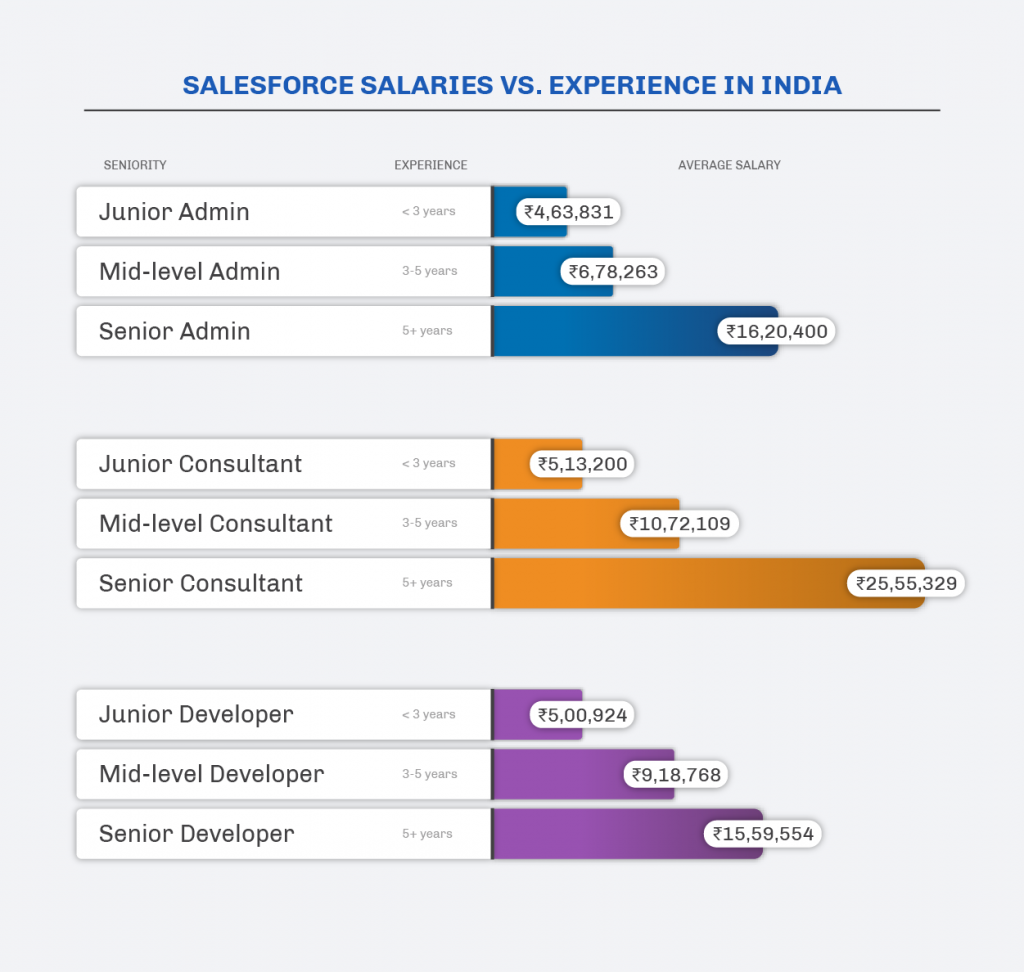
Salesforce Salaries vs. Certifications in India
This is one of the ‘golden’ questions: do Salesforce certifications increase salary? In previous guides, I have pointed out that even though Salesforce professionals with higher salaries do have more certifications, this may be due to their experience (if they have been working with Salesforce for longer); plus, certifications take time to study for, and complete.
Here I will talk through the two most popular roles from our survey respondents.
Salesforce Admin
Do Admins with more experience have more certifications? Do the top Admin earners have more certifications than the average experienced Admin?
| Seniority | Average No. Certifications | Max No. Certifications |
|---|---|---|
| Junior Admin | 1.2 | 4 |
| Mid-level Admin | 1.6 | 6 |
| Senior Admin | 3.5 | 13 |
Salesforce Admins in the top 20% of salary earnings had on average 3.2 certifications.
Aside from the Salesforce Administrator certification, the top 20% also had:
- Platform App Builder (11)
- Salesforce Advanced Administrator (9)
- Platform Developer I (4)
- Sales Cloud Consultant (3)
- Service Cloud Consultant (3)
- Platform Developer II (2)
- CPQ Specialist (2)
- Field Service Lightning Consultant (2)
- Einstein Analytics and Discovery Consultant (2)
- Community Cloud Consultant (1)
- Pardot Specialist (1)
- Marketing Cloud Admin (1)
- Salesforce Accredited B2B Commerce Developer (1)
Salesforce Developers
Do developers with more experience have more certifications? Do the top developer earners have more certifications than the average experienced developer?
| Seniority | Average No. Certifications | Max No. Certifications |
|---|---|---|
| Junior Developer | 1.6 | 9 |
| Mid-level Developer | 2.9 | 16 |
| Senior Developer | 4.8 | 16 |
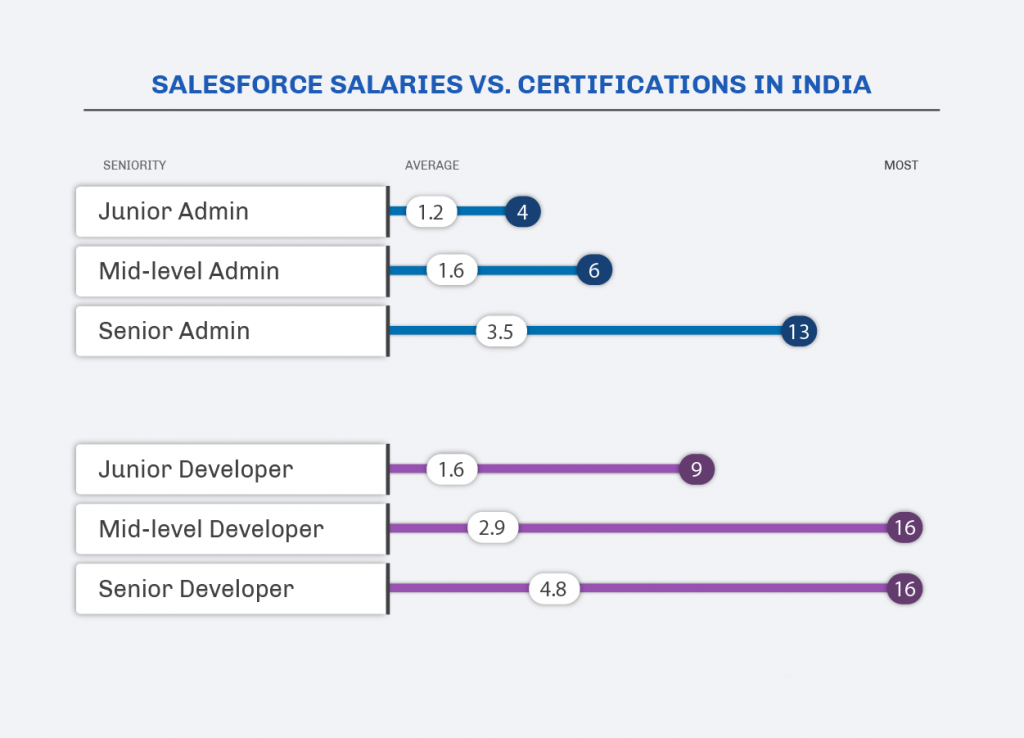
Salesforce Salary Factors
One single figure without context can be misleading: there will be a significant difference in the salaries based on certain factors.
In the other salary guides we have live on the blog, we have called out the following factors as ones that could determine an individual’s salary:
- Experience (Seniority)
- Background with Other Development Languages (developers)
- Certifications
- Generalists vs. Specialists
- Location
- Market Demand, Skill Supply
- End User vs. Consultancies
There are minor factors, such as if the role requires you to travel to onsite projects, however, we chose to leave misc. factors like these out because they apply to a small minority, and the impact on salary is negligible.
I recommend you take a look at our role-specific guides for the commentary relevant to your role:
Salesforce Admins, Consultants, Developers, Marketers.
Comments from Survey Respondents
We allowed respondents to share their thoughts on the last question of the survey; we deliberately left this a free text comment box to capture some great insight from Trailblazers.
These quotes are taken directly from the survey and do not necessarily reflect the opinions of Salesforceben.com.
Here are some of the responses:
- “Indian companies sometimes do not have specific jobs roles, for example, my exact role is not listed but I am doing what an architect does.”
- “Compared to the workload and amount of knowledge required, the salary is low, especially from what I have seen in Pune based companies.”
- “I do personally think that the hiring process and salary offered is not apt in India. It is not paid according to knowledge and hard work, but instead, is determined by the number of years spent in the industry (even if you gain ZERO knowledge)!”
- “I feel compensation is lower in India than other countries for Salesforce professionals”
- “It would be better if Salesforce sets a compulsory salary bar for companies offering Salesforce development services.”
- In small cities the salaries are still low, even if you have more experience. There should be a standard structure for salary according to experience, and not to the city.”
- “There’s a big gap in salaries when you compare India vs USA or other countries, which is way beyond the notion of difference in currency. It’s quite painful to see when people are not paid enough, while the world is moving ahead with technology advancements. This is a true story till now, let’s see what will be like in the future.”
- You get salary increases only when changing company. Only technical folks can rely on salary increases year on year – whether they are good technically or not!
- A lot of certified developers just can’t write the code good enough. Reading dumps and clearing exams is a bad precedence has been running for some time. Organizations have to maintain their partnership status with Salesforce, which forces them to get certified professionals.
Summary
Our first ever salary survey for India gathered 1670+ results over a 10 day period, thanks to all the amazing Trailblazers that were willing to build a picture of salaries in India.
The 7 questions covered the type of role, salary, years of experience, certifications, and location. We went away and analysed the results, which gave us insight into how salaries vary across India.